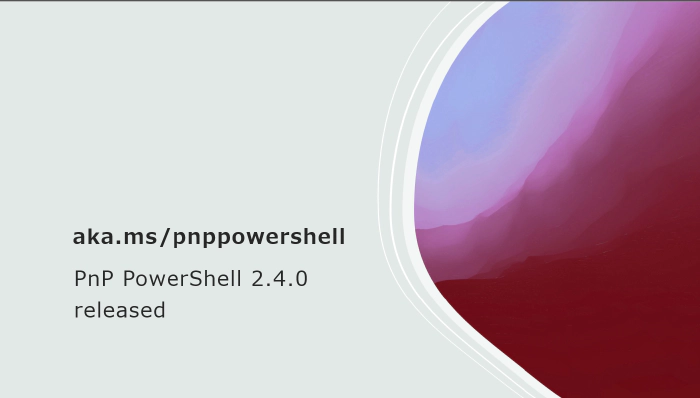
PnP PowerShell v2.4.0
PnP PowerShell
PnP PowerShell is a “swiss army knife” type of PowerShell Module providing over 650 cmdlets that work with Microsoft 365 services such as SharePoint Online, Microsoft Teams, Microsoft Project, Security & Compliance, Entra ID, and more. The advantage is that you will have a consistent way to work with a broad range of Microsoft products from a single connection. No need to download different PowerShell Modules, which all work in a slightly different way, requiring different ways of connecting and authenticating.
PnP PowerShell runs on any device on any platform. This means you can run it i.e. from a Windows machine, Mac, Linux based device, Azure Function, Azure Runbook or even a Raspberry Pi. All in the same consistent way.
For more information about installing PnP PowerShell, please refer to the documentation.
New version of PnP PowerShell – v2.4.0
We have released a new version, 2.4.0, of PnP PowerShell with quite a lot new features, improvements and lots of bug fixes.
This is also an important security update which fixes a moderate level vulnerability related to handling of access tokens. We highly recommend you to update to this latest version.
Major additions and changes
In this release, we added 15 new cmdlets and improved so many more.
Some key new features and cmdlets that we added with 2.4.0 release:
- Added
Get-PnPDeletedContainer,Restore-PnPDeletedContainer,Remove-PnPContainer,Get-PnPContainerTypeConfiguration,New-PnPContainerType,Remove-PnPContainerTypecmdlets to handle operations related to SharePoint Embedded. - Added
Convert-PnPFilecmdlets to allow converting a file from one format to another. It is especially useful if you want to convert office files like Word, Excel, PowerPoint to PDF. - Added
Get-PnPFileAnalyticsDataandGet-PnPSiteAnalyticsDatacmdlet to retrieve analytics information about a particular file or a site respectively, - All cmdlets which work for Power Platform now also support US Gov, US Gov High, US DoD and other cloud environment support. There has also been a change in the HTTP endpoints that we used for these cmdlets to retrieve access token. This was a breaking change we had to do due to changes in backend.
- Added
Set-PnPRetentionLabelandReset-PnPRetentionLabelcmdlets to support setting a retention label on list item.
Besides adding these new cmdlets, we also improved quite a lot of existing ones.
Set-PnPTenantcmdlet received quite a few new parameter additions which you can use to manipulate the tenant or the SharePoint sites.Add-PnPGroupMembercmdlet now also supports batch addition of members to a SharePoint group.Grant-PnPAzureADAppSitePermission,Add-PnPHubSiteAssociationandRegister-PnPManagementShellAccessandRegister-PnPAzureADAppalso now better support other cloud environments.Enable-PnPPageSchedulingandDisable-PnPPageSchedulingcmdlets now also support Viva connections enabled sites in a tenant.
You can find the full changelog here.
Contributors
This release wouldn’t have been possible without the help of (random order):
- Arleta Wanat
- Jenny Wu
- Aimery Thomas
- Nils Andresen
- Konrad K.
- Leon Armston
- Daniel Cecil
- Rohit Devmore
- Kunj Balkrishna Sangani
- Koen Zomers
- Reshmee Auckloo
- Nishkalank Bezawada
- Jørgen Wiik
- Siddharth Vaghasia
- Jürgen Rosenthal-Buroh
Thank you all for the time you chose to spend on PnP PowerShell and for your help to advance it.
Try it today
Get the latest major release of the PnP PowerShell from PowerShell gallery by executing:
Install-Module PnP.PowerShell
If you want to get the latest from the dev branch of PnP PowerShell, you can get it by executing:
Install-Module PnP.PowerShell -AllowPrerelease
If you need more help getting started or want more details about the commands, the architecture or the project, go to aka.ms/pnp/powershell.
If you see any room for improvement, please, don’t hesitate to reach out to us either on GitHub or Twitter.